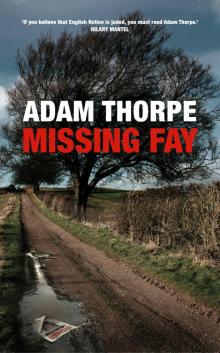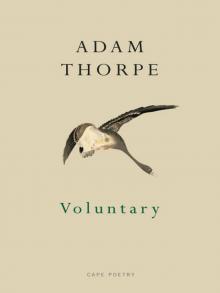- Home
- Adam Thorpe
Hodd Page 23
Hodd Read online
Page 23
I felt sure by now I was nearing Lundene, though still [gone] only southward as far as the neighbourhood of Dancaster, which then I knew not from the See of Grece or Babyloine.346 Several times I had been misguided in my direction by evil-hearted wayfarers and sly smilers and half-crazy wastrels, and almost run over by many a cart as I lay strengthless upon the grassy verge. And once in blear light an old woman at her cot’s door took me for a demon, thinking my harp to be my leathern wings, and raised a hue and cry – that I only escaped by plunging into a wood, and was much torn thereby.
Thereupon, on crossing a field in great terror of pursuit from that wood, I stumbled upon a piece of cork ballast, as was oft washed up on the hermit’s beach: yet this field was very far from the boundless sea. I looked up, thinking of what my good master had told me of the upper sea and its ships, but saw no proper oaken keel far overhead, but only a small dark cloud in the shape of a ship, that might have been mere fumosity of water. I burst into tears, full of grief and regret and hunger.
For, being hungry as a lion, I yet had no meat, and whatever abode I stopped at to beg, there was not even paste in the kneading-trough, so poor it was thereabouts; and the peasants crushed nuts instead and mixed them with ashes, and many were sick or dying in their cots. The nights were colder, though not yet so keen as to freeze the puddles upon the roads. And when some burly villeins found me sleeping in a barn, and took the filth and encrustations upon my face and limbs for leprosy, I was near pierced with a hay fork and most terrorised, and my harp thrown after me so that it struck the ground with a crack.
I wandered about I knew not where for another day or more, half-fainting as I trod, my harp’s wood split and my spirits in despair, until I lay in a dry ditch on the wayside, waiting for the comfort of sleep, that owing to my weakened state, would have been eternal – and e’en that I much wished for!
And then it was that brother Thomas found me, and took me in, for he said I was like a sleeping angel, and that his heart swelled with sorrow at my state. Though the road was not unpopulous, it was as a river that passes, and out of all who passed me and saw me, none stopped to see if I were still alive, nor if I required a Christian burial, for it was spitting sleet that day and they would not tarry.
Yet the good monk tarried, reining in his mount and alighting, to find me still breathing and not a cadaver for the dogs or wolves to gnaw at. And giving my harp to the carpenter of the abbey, he made it as new, as he made myself as new in both health and appearance.
2
And what was his reward, this Good Samaritan? To be cloven like an apple.
Though he was no strict follower of the Rule, and e’en gave the demons many a handle to lift him by, neither was he more wicked than most mortal sinners, whose weakness is their chief burden. Nay, what evil was there in his act of so-called betrayal? ’Twas not he in person who attacked Hodde in the holy sanctuary of the church, breaking sacred law: he but pointed the finger. And should so great a heretic and murtherer and robber as Roibert Hodd be granted sanctuary at all, who wished for all churches and holy places to be razed, along with those he named unbelieving – these unbelievers of his being not only every good Christian, but heathens and infidels alike? For Hodde cared for woods and other desolate places more than places of worship – and even the former he descried, believing them to be material clots in the sea of essence, like the greatest cliffs or rocks also were, that would dissolve on his death with all created things and flow eternally as from his bowels.
Strange it was, to feel the old and better influences revive in me from years before, as I played in the market place [of Nottingham], fraudulently blind yet singing my former songs of both courtly and sacred bent, so that the noise dulled into a roar as of the sea by the good hermit’s cave. Thus confusion already seethed in my heart and brain, when I heard a voice I knew, of most dulcet and maidenly tones, praising my playing: and opening my eyelids a fraction, as the blind can do, I perceived through the mist of my lashes, just as a painted buffoon peeks through a curtain at the audience, the grey-eyed damsel on the arm of her nurse, gazing upon me but a few feet away, in a dress brocaded with gold and silver.347 That she did not recognise me was no miracle, for I had never entered the Nonnery when she was lecherously imprisoned within, and she had never descried me skulking among the felons, though I was smitten by her at first sight.
I was so took by surprise that I stopped plucking my instrument, and oped my eyes wide for an instant, that some were startled by this; and thereupon I received the sharp dart of influence from that virginal gaze, so sorely that it lies here still in my liver, and troubles me even in my ninetieth year and more.
Then a simpering servant of hers did squeal, and thus the attendant throng were relieved into laughter and jeering: for I was staring straight at the lovely maiden Isabele, with both mine eyen crystal clear. She had plucked her eyebrows and her fair brow seemed like a hill of snow, and now she drew her wimple’s cloth over her mouth, as damsels do when grinning overmuch in merriment.
Litell Johne, whose false beard did make him look e’en more like Herod, struck me with his elbow, bidding me continue; but on seeing our deceit unmasked, he raised his hands and brought up from the well of lies yet another pail of foul water: ‘Aye, a wonderful thing it is,’ he cried, ‘when my son’s sight returns under the influence of a noble and fair presence; though ’tis always but a passing spasm, alas, as men do sometimes recover from ills for a day.’
And he secretly pinched me as the spectators paused in their laughter, ever gullible: and rolling my eyes, I shut them again and began to sing a famous song of love and knightly dalliance: yet my voice cracked like a pot, and shame covered my features in a red hue, and opening my eyes I saw the grey-eyed Isabele exposing her red mouth again, to cry out, ‘Methinks the poor boy not only cured of his blindness, but also become a lusty man!’ True it was, that my voice was uncertain at this time, yet I could pitch it very high and thus avoid perturbation. But her presence robbed me of all composure, as if she had broke my voice over her knee. Yet in that moment of great embarrassment, her thoughts entire were upon me, and me alone, as men terrorised by a thunderbolt know e’en in their wickedness that God deems them worthy His attention; or (as happened here last month) a negligent monk, cajoled by the Holy Mother in a fever’d dream, yet knoweth in his misery that he has been picked out by the Virgin from innumerable holy brothers.
The throng laughed heartily, and clapped, and grew greater in number, for simple-minded folk are drawn to cruel laughter as wolves to carrion – as in the time of [King] Stephyn, when mirth and torture were as one. Litl John buffeted some in the front, who were pushing too close, and in the melee we escaped, he dragging me by my elbow while some ruffians threw dung and stones and butcher’s entrails after us, as all cheats merit in their eyes.
Hastily looking back as we fled, I perceived the damsel and her retinue had moved away from the common herd to the shadow of a shop, but her face was still alight with merriment under the fine linen cap, and the nurse nodding gaily. Was this the creature whom Hodd revered as his holy bride, the heretical Virgin to his false Pope of Heaven? Nay, what snares these women are, that lure us by their comeliness and red mouths and fine stitchings and outward adornings of gold and silver thread! Who pluck out our livers and roll them in their lily-white hands, till we swoon with their dalliance, and swear ourselves bound to them and to serve them all our days!
Litl John was much displeased, and gave me a good clout upon the head with his palm, for we had drawn attention to ourselves; yet when we came to the postern gate, my head bowed as if sightless, the aged serjeant had not heard of the disgrace, and bid us enter after telling us of a lewd song he had heard long ago in the Holy Land, where they cry like wolves to peculiar instruments – for he had taken the cross348 and earned a hideous scar on his face, that passed like a piece of rope over one eye, rendering it as useless as a walnut shell, and made him have pity on me for my worse affliction; yet he was not one
whit the better for it in his soul, for he reeked of countless visits to the tavern.
Swiftly we followed the instructions of the lame felon Roger, turning left instead of right, and though we passed servants hurrying hither and thither with meats and jugs in the corridors (for the feast approached), none stopped us. Down narrow, turning stairs we hastened, after opening a low door: well set into the stone and slippery with dankness, the way was unlit, and we had no tapers, so that we must feel our progress with hands and feet. And verily I knew blindness then, and it was indeed wretched. By these stairs we showed ourselves349 in a dungeon passage lit here and there by torches, that exuded a bitter smell, and it was indeed as Hell must smell from afar off: for e’en less than a hundred miles across the plain of desolation, Satan’s kingdom would stifle a living man with its smoke and stench.
There were small monkish cells on either side, those occupied having their heavy doors well locked, each entrance little taller than my own boyish height; the groined ceiling of the passage being low enough to cut my companion’s head, he had to bend like a cripple. Our feet splashed through puddles [bleeding?] from the stone, and the slabs were slippery with filth. From within the cells there were groans and cries and shouts, made indistinct by the thickness of stone and oak; one prisoner sang, yet so bawdy was the song that it outmastered those of the felons, being the type one hears only on ships or in the lowest sort of tavern, full of harlots and cut-throats. There being no gaoler nor even guard [permanently?] in the dungeons (each door having two locked bolts of great heft), it was safe to smite the oak for an answer, that this might betray the occupant and reveal Hodde to us without raising [the alarm].
After curses and groans from within each door that we struck, and once a mad burst of laughter, as though we were disturbing fiends instead of wretches, Hodde’s voice did answer the blow with a blasphemous oath that seemed afar off and strange, saying we did come from a sow’s womb [volva].350 Wherefore we knew the door, and though almost lightless there (for the torches were sparsely ranged, and the passage twisted crookedly like a burrow), Litl John marked it discreetly with his dagger.
Then we found the hiding-place Roger Wylde had told us of: like a close-fitting closet or a garderobe, it was set into the wall further up and black with shadow, yet doorless. It was no wider than the holy cell of the Blessed Christina, that virgin of great repute, the tireless disciple of Roger of St Albans,351 who crouched on cold stone for four years, and endured such fasting and discomforts that no prisoner even in the dungeons of Nottyngam might have known the like, to attain her incredible heights of grace: yet she was hidden from all but her saintly master, who instructed her and tended her, uttering counsel through the thick planks that shut her in so that she could scarce move about. How different was our purpose!
Feeling a hook on the back wall, and a thick chain, we conjectured in whispers that it was a chamber for hanging a man upside-down, from the cruel times of the Normans, when these barbarous practices were common;352 although such tortures might still be used hiddenly by villainous lords.
I was much afraid, yet forced myself not to show it, for my trembling might be felt by Litel John, so close were we pressed together in this recess, as two peas in a pod. The noises of the dungeon echoed horribly, and moisture dripped; so foul was the air, as though this place was truly a garderobe, that I almost retched – and knowing that, if we were caught, then this prison would be our final destiny (were we not to hang), I felt a stifling as of one still breathing in a coffin, buried by error.
Horrid it was! Wriggling and slithering forms betokened rats, that squeaked with joy to find us, and several were crushed by my companion’s great tread. No living being can understand what it is to be in such a place, who hath not suffered a spell in a dungeon or similar hell-hole. And in the enchantments of sleep, that close-bound closet in the bowels of the castle of Notynggam still claspeth me about, with the breathing through his nose of the huge felon in my ear, so that I think again I am like to perish, and that this might be my eternal prospect after death. Terrible fate!
Quick we were to keep still as cadavers, when the foosteps rang out through the passages, with a clattering that betokened two men in mail. These not being the gaoler, but the sentries on their round, who had no keys but only a flaring torch that threw hideous shadows about, we pressed almost into the stones until they had passed. They were talking to each other most obscenely, and reeked of ale, or they would have perceived the glitter of our eyes.
So stiff and cold were we, by the time the big-bellied gaoler came with several guards, we had lost all awareness of time passing, for no bells sounded deeply enough, and no windows showed the changes of light. Yet it was little more than two hours! Imagine what it must be, to suffer years or a lifetime of this type of place; ’tis scarce a wonder, then, that men lose their minds and gnaw their own limbs – or dash their heads out upon the stones, rather than suffer such an existence.
We heard [the gaoler and his men] open the steel bolts of each door in turn, and hand in victuals, to curses and shouts and sometimes blows that stifled hideous screams; yet it was not now that we must intervene, but later, when the gaoler passed on his own before sleep, as was the rule, to tell the wretches that it was night, and douse the torches behind him before emerging by another stairway anigh the recess. So clasped by cold and dampness was I, that I might have been immersed in a well, and hardly cared whether we were discovered or no, if it meant being brought to daylight and soup. The men passed us carelessly, and quiet fell again upon that dread place; save the odd moaning and curse and the squealing of the rats, that troubled our ears with visions.
Finally then the gaoler came on his own, announcing nightfall, and bidding the wretches pray for their souls – though he said this with a great and mocking carelessness in his wheezy [anhelus] voice. And pausing no doubt before Hodd’s door, he asked in a womanly manner: ‘How is the tender clerk?’ – as though the infamous felon were an uncouth beanus!353 We heard not the answer, but only the gaoler’s mocking laugh and his foul oath, for he seemed drunken.
As he passed us with his torch, having doused each wall-light behind him, Litl John leapt upon him and took him by the throat, while I snatched away the flaming torch before it expired in a puddle. And the poor fellow was pierced in his great belly so thoroughly that the sword’s point rang against the wall on the far side of his entrails, and he expired with a snort.
Littel John took the keys in his hand from the dead man’s belt, and there being many, he hastened to try each one in the marked door [of Hod’s cell], until the bolt slipped and the oaken bar lifted, and we could enter. Yet we did not see a room in the light of the torch, but rather a great void and emptiness, at the base of which was a floor of sodden rushes and pools, walled with stones the size of great cushions, and heaving with vermin. The stench was so sour that it almost overpowered us (as where a sewer flows into a stream or a ditch or a cess-pit, outside a well-populated town), and we searched for a way down. Indeed, there was naught but a half-rotted ladder, for this was the deepest dungeon, in which only desperate criminals were sometimes kept. And in a corner, well chained, squatted our master alone, seeming fearful of the flaring torch, as if it was too bright.
How haggard he looked, even after a few days! In his eyes was not the gleam of conviction and assured victory, but that of madness; hast thou not heard how Satan’s huge round eyes mirror his own kingdom of fire and torment? A rat tugged at his sleeve, as doth a fiend’s claw tug at a sinner’s by the bath-house or the tavern; yet he did not shake it off, letting Litle John shatter the creature against the flinty stones. Our leader’s mouth was open like a simpleton’s between new-sprouted whiskers, as matted as those of a beggar’s; his hands lay idle beside him, and no more blasphemous oaths issued from him. He was fastened to the wall by a chain soldered to iron rings about each of his ankles, which rings bore sharp spikes upon the outside, and were pressed so tight they had rubbed his flesh raw.
There
was not a stick of furniture in this dungeon, nor a dry patch of rushes to sleep on, but all was rotted and infested, and so thick with fleas that already they were biting us and drawing blood, for their carrion was meagre. Were my torch to have been extinguished, absolute lightlessness would have descended upon us, for there was no window or even slit for air.354 Little wonder, then, that Hodd was half crazed already, raising only his arm to greet us as we searched to unlock his chains!
Under cover of the night, we bore him out of that dread place to the outside wall by the jaylers steyres, as Roger Wylde had named them, pausing only for Litl John to don the dead gaoler’s cloak. Indeed, as we were warned, the two watchhounds barked upon hearing our steps, and hurried towards us with slavering jaws and bared teeth; but on smelling their master the gaoler’s cloak, and being thrown the marrow-bones, they softened sufficiently that we could pierce their shaggy throats with our daggers, and they expired with no more than a whimper.
The wall being lowest in one place because of a loathsome and stinking dung-heap that rose against it like a hill, we scaled it forthwith; Hod being half carried by the big-shouldered felon to the parapet, mumbling much nonsense. Our leap was softened by the mud that met us, yet still I was winded, and we could see little: the moon being veiled in cloud. The castle wall here being also the outer wall of the city, with no need of the rampart, we had only the muddy ditch to pass: but on climbing down it, I slipped, and injured my knee so that it was torn. Yet I could not tarry, for there were many huts of paupers there, amongst which would no doubt be men and women eager to please the sceryf, and earn a few pennies by raising a hue and cry and arresting us, if we were to wake them in their kennels.355

 Missing Fay
Missing Fay Hodd
Hodd Pieces of Light
Pieces of Light The Standing Pool
The Standing Pool Ulverton
Ulverton Nine Lessons From the Dark
Nine Lessons From the Dark Flight
Flight The Rules of Perspective
The Rules of Perspective From the Neanderthal
From the Neanderthal Is This the Way You Said?
Is This the Way You Said? Still
Still No Telling
No Telling Voluntary
Voluntary Between Each Breath
Between Each Breath